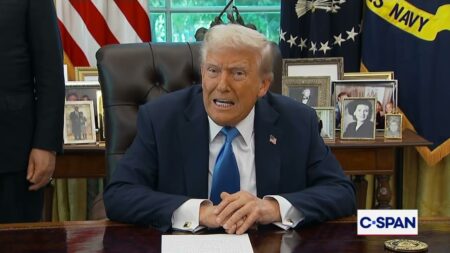Opinion
Trump Administration’s FTC Chairman Andrew Ferguson’s Assault on ‘Big Tech Censorship’ Aims to Override Constitutionally Protected Decisions.

Many Americans, including me, have had frustrating experiences with content moderation on social media platforms. Andrew Ferguson, the Trump-appointed chairman of the Federal Trade Commission, wants us to know that such experiences are not just annoying or perplexing; they are “un-American” and “potentially illegal.”
Ferguson, who began soliciting complaints about “Big Tech censorship” last week, touts his initiative as a blow against “the tyranny of Big Tech” and “an important step forward in restoring free speech.” But like Brendan Carr, the Trump-appointed chairman of the Federal Communications Commission, Ferguson is flexing his regulatory powers in a way that undermines freedom of speech by meddling in private editorial choices.
Last July, the Supreme Court recognized that social media platforms, in deciding which speech to host and how to present it, are performing essentially the same function as newspapers that decide which articles to publish. “Traditional publishers and editors,” Justice Elena Kagan wrote in the majority opinion, “select and shape other parties’ expression into their own curated speech products,” and “we have repeatedly held that laws curtailing their editorial choices must meet the First Amendment’s requirements.”
That principle, Kagan said, “does not change because the curated compilation has gone from the physical to the virtual world. In the latter, as in the former, government efforts to alter an edited compilation of third-party expression are subject to judicial review for compliance with the First Amendment.”
That decision involved Florida and Texas laws that, like Ferguson’s dubious assertion of regulatory authority, aimed to fight “Big Tech censorship” by restricting content moderation. Texas said its law was necessary to prevent “viewpoint discrimination,” which is presumptively unconstitutional when the government does it.
“The innocent-sounding phrase does not redeem the prohibited goal,” Kagan said. “Texas does not like the way those platforms are selecting and moderating content, and wants them to create a different expressive product, communicating different values and priorities. But under the First Amendment, that is a preference Texas may not impose.”
Ferguson is attempting something similar by suggesting that social media platforms may be engaging in “unfair or deceptive” trade practices when they “deny or degrade” users’ “access to services” based on “the content of users’ speech.” In practice, ensuring “fair” treatment of users means overriding editorial decisions that the FTC deems opaque, unreasonable, inconsistent or discriminatory.
The challenge of making sure that social media are “fair and balanced” is illustrated by a 2004 FTC complaint against Fox News.
Two left-leaning advocacy groups claimed the news outlet’s use of that slogan amounted to deceptive advertising. Assessing that complaint, then-FTC Chairman Timothy Muris noted, would require “evaluating the content” of the channel’s news coverage — a probe foreclosed by the First Amendment.
Ferguson’s inquiry likewise treads on constitutionally protected judgments. His avowed goal is to increase the diversity of opinions expressed on social media. Like Texas, he wants platforms to offer “a different expressive product” that better fits his personal preferences.
Conservatives rightly objected when the Biden administration pressured social media platforms to suppress “misinformation” that it viewed as a threat to public health, democracy, or national security. They are rightly skeptical of laws that encourage platforms to crack down on “hate speech,” a similarly amorphous category that, however you define it, is indisputably covered by the First Amendment.
Those conservatives should not applaud Ferguson as he tries to put the government’s thumb on the scale in the name of fairness. If the FTC can second-guess editorial judgments to achieve what a Republican majority thinks is the right mix of opinions, a future commission controlled by Democrats can enforce a different agenda.
“Calling something censorship doesn’t make it so, and framing content moderation as ‘unfair or deceptive trade practices’ does not magically sidestep the First Amendment,” notes Ari Cohn, lead counsel for tech policy at the Foundation for Individual Rights and Expression. “And as always, beware — authority claimed while one is in power will still exist when one is not.”
Censored by Facebook! Smith & Wesson Fights Back, Rallies 2A Community to Join X
FTC Should Focus on 2nd Amendment as the #1 Most Disfavored Political Speech
About Jacob Sullum
Jacob Sullum is a senior editor at Reason magazine. Follow him on Twitter: @JacobSullum. During two decades in journalism, he has relentlessly skewered authoritarians of the left and the right, making the case for shrinking the realm of politics and expanding the realm of individual choice. Jacobs’ work appears here at AmmoLand News through a license with Creators Syndicate.







I just think that if social media platforms are treated as publishers with editorial discretion, then they lose their protection as a “platform” under section 230 of the communications decency act.
I totally agree with this article but IMO one of the most important factors has been left out or I missed it and that is that the Supreme court decided in all it’s infinite wisdom that the government should decide what is fake news and what is not and should be able to tell news agencies what to publish. That is against the first amendment IMO. Even our courts are showing militant tendencies with opinions like that, again, IMO and my two cents. Oregoneistan, losing freedom one law and rule change at a time each time our legislature is in… Read more »
The only concern should be outright threats, scams or child abuse. Otherwise, speech is free, even if it offends your delicate fweeIings.
Most of my comments on fb , twitter, snd youtube have simply vanished. Other times they told me “against their standards”. I never even swore. Meanwhile you should see the name’s and threats they have allowed towards me. . My polite comments about— ‘
Biden and Harris saying covid killed over 200MILLION Americans, during the biggest fear campaign in history’
Stuff like that. Or about how men cant turn into girls and have babies, or how Jesus Saves etc.
What he says might have merit, but there’s a couple of problems. First, is a monopoly. I think it’s fair to say Youtube has a monopoly on video sharing. Google no doubt has a monopoly on search engines. Twitter/X is nearly if not a monopoly on… Shall we say idea sharing? When does a company become so big that it becomes a monopoly? Does the writer factor that into his opinion? Is he so “free trade” as to believe monopolies are good? Further, how much has big tech received in subsidies? Outside of the gun industry, every industry has received… Read more »
It would’ve been nice if the writer had given his thoughts on Trump’s ‘Digital Bill Of Rights’ which he proposed during the campaign.
Without covering that, this article is, sorta missing a major elephant in the room.